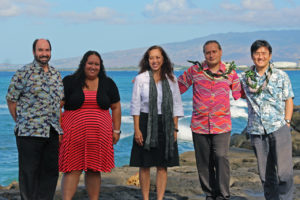Two Hawaiian Students Receive Doctoral Fellowships

Left to right: Dr. Robert Richmond, Narrissa P. Spies, Cheryl Ka‘uhane Lupenui, Lelemia Irvine, Dr. Albert S. Kim. Photo courtesy of The Kohala Center.
The Kohala Center, a Hawai‘i Island nonprofit focused on research, conservation and education efforts, has awarded fellowships to two Native Hawaiian students pursuing doctoral degrees at the University of Hawai‘i at Mānoa.
Narrissa P. Spies, a University of Hawai‘i at Hilo graduate who is pursuing a doctorate in zoology, and Lelemia Irvine, a doctoral candidate in civil and environmental engineering, will each receive $45,000 and mentorship through The Kohala Center’s Hawaiian Scholars Doctoral Fellowship Program to support the completion of their dissertations during the 2017–2018 academic year.
“The Kohala Center is committed to cultivating indigenous leadership and increasing the representation and visibility of Kānaka ‘Ōiwi (Native Hawaiian) scholars in academia, research institutions, and publications,” said Cheryl Ka‘uhane Lupenui, president and chief executive officer of The Kohala Center. “We are excited to welcome Narrissa and Lelemia to a larger cohort of 35 distinguished alumni who are advancing ‘ike Hawai‘i (Hawaiian knowledge) for generations to follow.”
The one-year fellowship, previously known as the Mellon-Hawai‘i Doctoral and Postdoctoral Fellowship Program, supports the work of Native Hawaiian scholars expanding knowledge in the realms of the islands’ natural and cultural landscape, as well as history, politics and society. The program is supported with funding from Kamehameha Schools, the Deviants from the Norm Fund, and Dr. Paul and Elizabeth Nakayama.
Spies’ is investigating how specific species of coral are thriving in the face of declining marine health in Hawai‘i due to rising ocean temperatures, pollutants and sediment runoff. She has observed two coral species in Honolulu Harbor with resilient traits and hopes to better understand how they adapt to stress and regenerate to benefit other struggling species in Hawai‘i and around the world.
“While corals continue to face stress as a result of climate change, these two coral species serve as excellent models for studying the resilience of corals to stress, and may provide insights that can help resource managers in other parts of the world,” Spies said. “My work lays the foundation for understanding resilient coral species, which can hopefully give us clues as to why they’re so well adapted to inhospitable habitats such as harbors. If there are still healthy corals in Hawai‘i in 50 years, I hope it will be because we’ve been able to build off the work I’ve done throughout my Ph.D. and applied this to other corals on our reefs.”
Spies was born and raised on Hawai‘i Island and received her bachelor’s and master’s degrees at UH Hilo. Her mentor for the fellowship year is Dr. Robert Richmond, professor and director of the Kewalo Marine Laboratory at UH Mānoa.
Irvine’s doctorate work aims to develop a better understanding of low-impact development and green infrastructure approaches. Using computational fluid dynamics and 3D modeling techniques, Irvine is addressing engineering challenges to predict the performance of these types of systems to find new ways to increase sustainable landscapes, communities, villages and cities.
“My life’s research work in water has taken me to more than 20 countries to learn how to solve challenges in transforming rain’s tears to clean water,” Irvine said. “My work in sustainability merges engineering and culture in an effort to solve some of the daunting problems Hawai‘i faces. Through the mo‘olelo (written and oral narratives) and active mentorship of my ‘ohana (family) and kumu (teachers), I learned that I am descended from great engineers, and I strive to channel their wisdom from within to help bring long life to my ‘ohana, our island communities, and Hōnua (Earth) itself.”
Irvine is originally from Wai‘anae, O‘ahu, and received his bachelor’s and two master’s degrees from UH Mānoa. He is being mentored by Dr. Albert S. Kim, an associate professor of civil and environmental engineering at UH Mānoa.
Since 2008, The Kohala Center’s fellowship programs have awarded $1.57 million, supporting 37 Native Hawaiian scholars. Many of the recipients have since received tenure in academic institutions and published original research. The Kohala Center is currently seeking new partners to continue offering fellowships to advance Native Hawaiian intellectual leadership in the islands.






